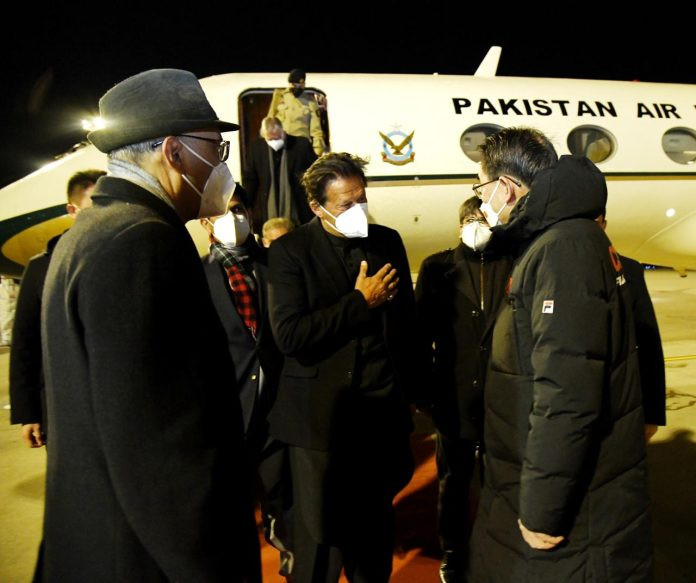
Prime Minister Imran Khan on Thursday arrived in Beijing on a four-day official visit where he would join other world leaders attending the opening ceremony of the Beijing Winter Olympics scheduled to be held on Friday.
Accompanied by a high-level delegation including federal cabinet members, the premier would also meet the Chinese leadership.
Foreign Minister Shah Mahmood Qureshi, Finance Minister Shaukat Tarin, Planning Minister Asad Umar, Information Minister Chaudhry Fawad Hussain, National Security Adviser Dr Moeed Yusuf, Commerce Advisor Abdul Razak Dawood and Special Assistant on China-Pakistan Economic Corridor (CPEC) Khalid Mansoor are part of the prime minister’s delegation.
Read more: Visit to China 'very important' for Pakistan's economy: Tarin
On his arrival at Beijing Capital International Airport, PM Imran was welcomed by the Assistant Foreign Minister of China Wu Jianghao. Pakistan’s Ambassador in Beijing Moeenul Haq and senior embassy officials were also present.
Besides attending the ceremony of the Beijing Winter Olympics, Imran Khan will also meet President Xi Jinping and Premier Li Keqiang.

During the meeting, the two leaderships would discuss the ways to promote bilateral trade and economic cooperation, particularly under the CPEC framework, besides the regional and international affairs.
Besides the virtual interactions with the prominent Chinese business leaders, top think tanks, intellectuals and media, other bilateral meetings are also on the prime minister’s agenda of the visit.
This is the prime minister’s fourth visit to China as he paid his last visit in October 2019.
PM orders removal of 'red tape'
Prior to his visit, PM Imran ordered the removal of red tape hindering the Chinese investment in Pakistan, ordering “the removal of 37 regulations to ensure one-window operation for foreign investors.”
Also read: "IK’s visit to China proves ‘uniqueness’ of Pak-China ties"
Pakistan and China supported each other in their fight against the Covid-19 pandemic and pushed forward high-quality development of CPEC, while Beijing had invested over $25 billion in Pakistan on CPEC projects generating 80,000 jobs, producing 5,500KW of electricity and building over 500 kilometres of roads.
Prime Minister @ImranKhanPTI arrived at Beijing Capital International Airport, Beijing, where he was received by Assistant Foreign Minister of China H.E Mr Wu Jianghao.#PMIKinChina pic.twitter.com/SkEi3iBnzi
— Prime Minister's Office, Pakistan (@PakPMO) February 3, 2022
The cooperation between the two countries against the Covid-19 pandemic has remained exemplary. President Dr Arif Alvi visited China in March 2020 to express solidarity with the Chinese people.
Pakistan is one of the earliest supporters and participants of President Xi Jinping’s Belt and Road Initiative (BRI). As BRI’s flagship project, the CPEC complements the Pakistani government’s vision of economic sovereignty.
The PM’s visit would mark the culmination of celebrations commemorating the 70th anniversary of the establishment of diplomatic relations between 🇵🇰 and🇨🇳, with more than 140 events organized to showcase the resilience of the All-Weather Strategic Cooperative Partnership...
— Prime Minister's Office, Pakistan (@PakPMO) February 3, 2022
China’s non-financial direct investment in countries under the BRI reached $17.99 billion from January to November in 2021, up 12.7 per cent year-on-year despite the ongoing Covid-19 pandemic and gloomy global investment environment.
The CPEC is a transformational project. Among 70 early-harvest projects, 46 have been launched or completed with a total investment of $ 25.4 billion creating 80,000 local jobs.
'All-weather and time-tested friend'
PM Imran’s visit to China is likely to help enhance investment in the power sector, revive Pakistan Steel Mills and accelerate the relocation of industries to the Special Economic Zones under CPEC.
Officials said the visit was primarily aimed at sending a message to China’s adversaries that Pakistan stood behind its “all-weather and time-tested friend”.
However, the visit, which is not officially a bilateral one, is also being used as an opportunity by Islamabad to discuss some pressing bilateral issues, including CPEC.
The visit would seek $3 billion in loan to stabilise Pakistan’s dwindling foreign currency reserves and boost investment in various sectors of the economy. The premier may also ask his Chinese counterpart to roll over the loans taken by Pakistan for different projects including the energy sector under CPEC.
The Pakistani government has already settled its issues with independent power producers by reducing the rate of return.
New cold war?
Pakistan’s relationship with China has become more significant in view of the new cold war between China and the US. Although Pakistan has made it clear it would not become part of “block politics”, it is evident that Islamabad is more inclined towards Beijing in an increasingly polarised world.
The evidence of that is that the prime minister is attending the opening ceremony of the Winter Olympics, which is otherwise boycotted by the US and certain other western countries. The premier earlier skipped the Democracy Summit hosted by US President Joe Biden.
The reason Pakistan stayed away from the summit was that the US had extended an invitation to Taiwan, which China considers part of its mainland territory.
Pakistan had consulted China before making the final call. Beijing had appreciated Pakistan’s stance on the Democracy Summit.
Observers believe that the upcoming visit of the premier to Beijing will be closely watched as he would not only meet with the Chinese leadership but interact with the Russian president too.
(With additional input from APP)

1731570137-0/BeFunky-collage-(56)1731570137-0-165x106.webp)
1731570357-0/elon-musk-(1)1731570357-0-165x106.webp)

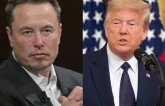

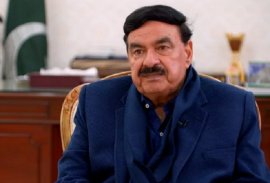

1731565450-0/BeFunk_§_]_-(15)1731565450-0.jpg)

1731562710-0/Untitled-design-(3)1731562710-0-270x192.webp)
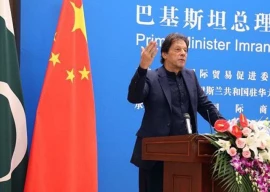
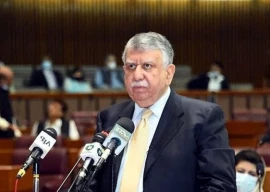







COMMENTS
Comments are moderated and generally will be posted if they are on-topic and not abusive.
For more information, please see our Comments FAQ